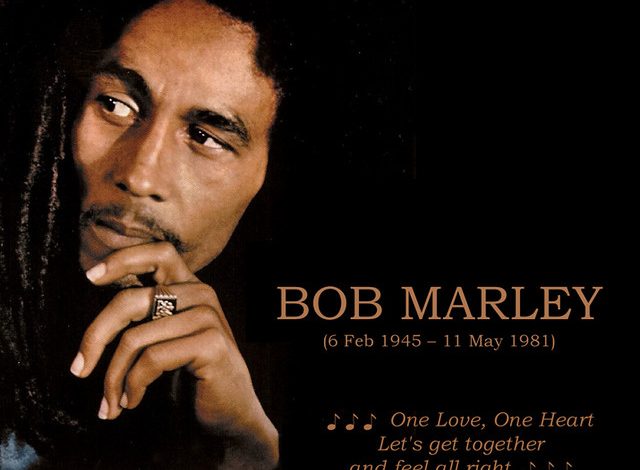Bob Marley and Rastafarianism: The Untold Story

Bob Marley, a towering figure in the world of music, remains unmatched in his embodiment of reggae. While not its sole creator, Marley’s pivotal role in shaping the genre from its roots in Kingston to global prominence is unparalleled.
Born on February 6, 1945, Marley’s legacy transcends his tragically short life of 36 years. His 1984 compilation album, “Legend,” continues to sell over a quarter-million copies annually, with each track serving as a testament to his enduring influence.
From timeless classics like “Buffalo Soldier” to the anthemic “One Love,” Marley’s music resonates across generations, solidifying his status as a cultural icon.
Bob Marley Early Life
Marley’s upbringing was marked by a unique family dynamic. Born to Cedella Booker, a Jamaican native, and Norval Marley, a British supervisor, Marley’s heritage was as diverse as his music.
Despite his father’s absence, Marley’s indomitable spirit and unwavering dedication propelled him from the streets of Kingston to global acclaim.
Raised in poverty in Nine Miles, Jamaica, Marley’s early years were characterized by resilience and determination. His migration to Kingston marked the beginning of a transformative journey that would redefine the cultural landscape.
In Trenchtown, Marley honed his craft as a street fighter, earning the moniker “Tuff Gong” for his strength and fortitude. This resilience would later define his musical career, culminating in the founding of the iconic record label that would spread reggae to audiences worldwide.
Marley’s proficiency in street fighting earned him a moniker that resonated throughout his lifetime: “Tuff Gong.” This nickname later became the namesake of the record label he established, a pivotal entity in popularizing reggae music globally.
A poignant reflection of this period in Marley’s life can be found in his iconic 1974 track “No Woman, No Cry,” where he reminisces, “I remember when we used to sit / In the government yard in Trenchtown / Observing the hypocrites / Mingle with the good people we meet.”
A Fateful Incident: How a Welding Accident Shaped Bob Marley’s Musical Journey
In the early ’60s, amidst the vibrant music scene of Kingston, Bob Marley was already exploring his musical talents alongside his childhood friend Neville Livingston.
However, Marley’s mother, Cedella, aware of the uncertainty of a music career, sought to provide him with a backup plan. At the age of 14, she arranged for Marley to apprentice as a welder, despite his lack of enthusiasm for the trade.
However, fate intervened in Marley’s path. During one fateful day in the workshop, a piece of scalding hot metal flew into Marley’s eye, abruptly ending his apprenticeship and leaving him in excruciating pain.
This incident marked the turning point in Marley’s life, prompting him to fully commit himself to his true passion: music.
Yet, from this unfortunate accident emerged an unexpected silver lining. Marley’s time as a welder’s apprentice forged a friendship with fellow welder Peter Tosh, who shared Marley’s musical aspirations.
Together with Livingston, they formed the nucleus of what would become The Wailers. However, before they were ready to conquer the music world, they required further refinement and guidance.
Thus, Marley’s journey from apprentice welder to musical legend was not only defined by his resilience and determination but also by the chance encounters and friendships that shaped his path.
The welding accident may have altered Marley’s trajectory, but it ultimately set him on the course to fulfill his destiny as one of the most influential musicians of all time.
ALSO READ: Martin Luther King Jr
Bob Marley’s Mentor: The Influence of Joe Higgs on Reggae
During the vibrant musical era of Kingston in the early ’60s, one towering figure stood out amidst the bustling scene:
Joe Higgs, often hailed as the godfather of reggae. Teaming up with fellow Trenchtown resident Delroy Wilson, Higgs showcased a distinctive singing style coupled with a passion for nurturing budding talents within Kingston’s music community.
A singer, songwriter, and guitarist, Higgs generously shared his expertise with aspiring musicians who sought guidance in the intricacies of singing and songwriting.
Among his notable protégés were the legendary trio of Bob Marley, Peter Tosh, and Bunny Wailer, who would go on to reshape the landscape of reggae music.
Higgs, renowned for his protest songs, imparted invaluable wisdom to his mentees, covering essential aspects such as breath control, guitar composition, and the art of crafting meaningful lyrics.
Despite his pivotal role in their development, Higgs remained humble, preferring to stay out of the limelight even as Marley and The Wailers soared to fame.
Although Higgs maintained a low profile, his influence reverberated through the music of Marley and his contemporaries.
In a testament to his impact, Higgs co-wrote “Stepping Razor,” a solo hit for Tosh, and joined The Wailers on a U.S. tour in the early ’70s.
While Higgs may have passed away in 1999, his legacy endures, forever intertwined with the rich tapestry of Jamaican music history, alongside the indomitable spirit of Bob Marley.
Bob Marley’s Betrayal: Exploited by his First Producer
In the early ’60s, Leslie Kong, a Chinese-Jamaican entrepreneur, stumbled into the role of a record producer when a young aspiring singer named Jimmy Cliff crossed paths with him in Kingston.
Impressed by Cliff’s talent, Kong swiftly formed a partnership with him, launching Cliff’s successful recording career under Kong’s label, Beverley’s.
As Cliff thrived with hits like “Hurricane Hattie” and “Miss Jamaica,” he also introduced Kong to another rising star: Bob Marley.
Under Kong’s wing, Marley made his initial recordings, but his collaboration with the businessman was tainted by exploitation.
Kong shamelessly underpaid Marley, offering a mere $20 for his contributions, a fraction of what Marley deserved.
Despite the unfair treatment, Marley and The Wailers continued to work with Kong, a testament to the prevalent shady business practices in Jamaica at the time.
However, Kong’s greed and disregard for ethics would ultimately lead to his downfall. In 1970, without consulting The Wailers, Kong announced plans to release a compilation album titled “Best of the Wailers.”
This decision incurred the wrath of Bunny Wailer, who, according to folklore, placed a curse on Kong.
Tragically, just a year after the album’s release, Kong succumbed to a heart attack at the young age of 37, potentially fulfilling the ominous prophecy.
Marley’s early encounters with Leslie Kong serve as a poignant reminder of the exploitation often faced by artists in the music industry, yet his resilience and talent transcended such adversities, propelling him to become an icon of reggae music and a symbol of justice and equality worldwide.
Bob Marley’s Musical Legacy Begins: A Message to His Mother
Bob Marley and the Wailers embarked on a journey marked by musical excellence and social commentary, guided by none other than Clement “Sir Coxsone” Dodd, the esteemed producer behind Studio One.
Under Dodd’s mentorship, the Wailers honed their craft and churned out numerous chart-topping hits, firmly establishing themselves in Jamaica’s music scene.
Their inaugural success came in the form of “Simmer Down,” a plea for peace directed at the notorious “rude boys” of Kingston.
Marley’s lyrics urged restraint and non-violence, resonating with audiences beyond just the music. Interestingly, the song held a personal significance for Marley—it served as a reassurance to his mother, Cedella, who harbored concerns about her son’s association with Trenchtown’s rough crowd.
“Simmer Down” was Marley’s humorous yet heartfelt way of affirming his divergence from the street toughs his mother feared.
Bob Marley’s Unexpected Connection to Delaware
Following the death of Marley’s father, Cedella remarried and relocated to Delaware, potentially around 1966.
Marley, accompanied by his wife Rita, briefly resided in Delaware, where their presence remained relatively unknown to their neighbors.
It was through chance encounters, such as Rita’s visit to Ibis and Genny Pitts’ gift shop, that their connection to Marley was unveiled.
Ibis Pitts, a drummer, struck up a friendship with Marley, bonding over their shared love for music.
Pitts was captivated by a Wailers record gifted by Rita and even journeyed with Marley to Jamaica, where he witnessed the fervent adoration of fans and fellow musicians alike.
Inspired by Marley’s enduring influence, the Pitts family organized the People’s Festival for Peace in Wilmington, Delaware, in 1984, as a tribute to the legendary musician—a tradition that continues to honor Marley’s legacy to this day.
Bob Marley’s Spiritual Journey: Embracing Rastafarianism
Bob Marley’s path to embracing Rastafarianism took shape during a significant moment in Jamaican history: Grounation Day on April 21, 1966, marked by the visit of Haile Selassie, the Emperor of Ethiopia, to the island.
This event stirred widespread excitement, particularly among the Rastafari community, who revered Selassie as the literal incarnation of God.
Rastafarianism, a belief system originating in Jamaica, centers on the eventual repatriation of Africans to Africa, envisioned as a return to Zion, or a holy land, with Selassie representing divine authority.
Marley, then residing in Delaware, found himself drawn to the spiritual fervor surrounding Selassie’s visit.
The encounter prompted Marley to delve deeper into Rastafarianism, ultimately leading to his conversion and adoption of the distinctive dreadlocks synonymous with the faith.
Despite being in his early twenties at the time, Marley’s newfound spirituality profoundly influenced his life trajectory and, notably, his musical expression upon his return to Jamaica to reunite the Wailers in the late ’60s.
The Alleged Exploitation of the Wailers by Lee “Scratch” Perry
The partnership between Bob Marley and the Wailers and producer Lee “Scratch” Perry is heralded for its pivotal role in shaping reggae music.
Perry’s production of the album “Soul Rebels” marked a milestone for the band, introducing their signature sound to a global audience.
However, despite the album’s success, allegations of financial exploitation cast a shadow over their collaboration.
Bunny Wailer, a founding member of the Wailers, openly accused Perry of withholding royalties owed to the band, alleging that Perry profited unjustly from their work.
In a candid interview with Rolling Stone, Wailer expressed his resentment, claiming they never received proper compensation for their contributions to the albums produced under Perry’s guidance.
Marley and the Wailers echoed these sentiments through their music, with the lyrics of the 1973 song “Trenchtown Rock” serving as a veiled critique of Perry’s actions.
Despite Perry’s denial of any wrongdoing, the allegations underscore the complex dynamics of artistic collaboration and financial exploitation within the music industry.
ALSO READ: Boxing Muhammad Ali: A Legacy of Family, Boxing, and Courage
Boxing Muhammad Ali: A Legacy of Family, Boxing, and Courage
Johnny Nash Collaboration: A Missed Opportunity for Bob Marley
Bob Marley encountered another potential breakthrough in his career when he was approached by American manager Danny Sims and soul singer Johnny Nash at a party in Kingston.
Recognizing Marley’s talent, they proposed a collaboration: Marley and the Wailers would assist Nash in London with songwriting, and in return, they would open shows for Nash and potentially secure a contract with his label, CBS Records.
While Nash benefited from the partnership, recording Marley’s compositions like “Stir It Up” and achieving success with the reggae-infused hit “I Can See Clearly Now,” Marley grew disillusioned with the arrangement.
His dissatisfaction stemmed from Nash’s lack of understanding of reggae and Rastafarian culture, leading Marley to feel disconnected from the project.
Furthermore, CBS Records’ decision to push the band to record “Reggae on Broadway,” a song that diverged from their authentic sound, soured the relationship, prompting Marley and the Wailers to terminate the agreement.
Island Records: Bob Marley’s Gateway to Global Fame
Following their disappointing experience with Johnny Nash, fate intervened for Bob Marley and the Wailers in an unexpected encounter with Island Records founder Chris Blackwell.
Despite financial struggles and their need to return to Jamaica, the group’s meeting with Blackwell marked a turning point in their career trajectory.
Impressed by their presence and convinced of their potential, Blackwell offered the band an opportunity to record an album with Island Records, recognizing their ability to appeal to a broader audience beyond Jamaica.
Without a formal contract, Blackwell provided the band with the resources to produce their breakthrough album, “Catch a Fire.”
This pivotal moment launched Bob Marley and the Wailers into the global spotlight, solidifying their status as reggae legends and paving the way for their enduring legacy in music history.
Bob Marley’s Brush with Death Amidst Political Turmoil
In the turbulent political landscape of 1970s Jamaica, Bob Marley’s journey extended beyond music into the realm of activism, particularly in his efforts to bridge the divide between Jamaica’s opposing political factions.
Amidst escalating tensions between the liberal People’s National Party (PNP) and the conservative Jamaica Labour Party (JLP), Marley aimed to foster unity through a free concert titled “Smile Jamaica” on December 5, 1976.
However, just two days before the event, tragedy struck. While rehearsing at Marley’s Kingston residence, the band fell victim to a violent attack, with bullets piercing their home.
Marley sustained a gunshot wound to his arm, while Rita Marley narrowly escaped injury.
Undeterred by the attempt on his life, Marley courageously took to the stage for the concert, the bullet still lodged in his arm, embodying his unwavering commitment to his cause.
Despite the harrowing ordeal, Marley’s dedication to peace remained steadfast.
Two years later, he orchestrated the historic One Love Peace Concert, where he brought together the warring political leaders Michael Manley and Edward Seaga, urging them to reconcile publicly.
Marley’s pivotal role in fostering unity earned him global recognition, culminating in the United Nations awarding him the Medal of Peace.
Kurtis Blow’s Encounter with Reggae Royalty
During Bob Marley and the Wailers’ triumphant final tour of the United States, a young Kurtis Blow, an emerging rapper, found himself in awe of the reggae icon.
Sharing the stage with Marley at New York’s Madison Square Garden, Blow was humbled by the opportunity to witness Marley’s legendary performance firsthand.
Recalling the encounter on Ice-T’s Final Level podcast, Blow reminisced about the promoter’s decision to include Marley on the bill, which resulted in rapid sell-out shows.
Backstage, Blow was taken aback when Marley approached him, expressing appreciation for his music.
Marley’s gesture left a lasting impression on Blow, underscoring the profound impact of encountering a revered figure in the music industry.
Bob Marley’s Tragic Battle with Cancer and Religious Convictions
Bob Marley’s deep-rooted commitment to the Rastafarian faith not only defined his music but also influenced critical decisions regarding his health, ultimately leading to his untimely demise.
When a cancerous lesion initially appeared beneath his toenail in the late 1970s, Marley dismissed it as a mere sports injury, typical for an avid football player.
However, as the condition worsened and was diagnosed as melanoma, medical experts recommended amputation of the affected toe, a suggestion Marley refused due to religious beliefs against dismemberment.
Although Marley consented to a skin graft, the cancer metastasized, spreading throughout his body.
Despite urgent medical intervention being imperative, Marley opted for alternative treatments centered around dietary changes, administered by a German physician.
After an unsuccessful eight-month battle, Marley’s health deteriorated rapidly during a flight home to Jamaica, necessitating emergency hospitalization in Miami, where he passed away on May 11, 1981.
The Ethiopian Connection: Marley’s Spiritual Journey
In 1978, Bob Marley embarked on a transformative journey to Ethiopia, retracing the footsteps of Emperor Haile Selassie, whose visit to Jamaica had profoundly impacted Marley’s spiritual beliefs.
During his stay in Shashamane, a Rastafarian settlement endorsed by Selassie, Marley engaged in cultural exchanges, including performances for Ethiopia’s royalty, visits to sacred sites, and creative endeavors that inspired his music.
Decades later, Marley’s reverence for Ethiopia was reciprocated with the unveiling of a statue in Addis Ababa, honoring his enduring legacy.
However, controversies arose when Rita Marley expressed intentions to rebury her husband in Ethiopia, citing his profound connection to Africa.
This proposal sparked debate in Jamaica, where Marley is celebrated as a national icon, with some contesting his desired resting place.
Despite the discourse, Marley’s remains remain interred in Jamaica, his spiritual homeland and the birthplace of Rastafarianism.
THE LEGACY LIVES ON: THE BOB MARLEY FOUNDATION’S CONTINUING IMPACT
Though Bob Marley’s physical presence may have departed over four decades ago, his enduring legacy flourishes through more than just his musical compositions.
Established in 1986 by Rita Marley, the Bob Marley Foundation stands as a beacon of hope and inspiration, dedicated to perpetuating the spiritual, cultural, social, and musical ideals that guided Marley throughout his lifetime.
With a commitment to making a meaningful difference in the lives of Jamaicans, the Foundation has embarked on remarkable initiatives over the years.
It has facilitated access to higher education by awarding numerous university scholarships, while also supporting primary schools nationwide by providing essential resources like books, school supplies, and crucially, tablets for remote learning during the challenging times of the COVID-19 pandemic.
Furthermore, the Foundation’s impact extends to healthcare, as it has equipped hospitals and clinics with modern medical equipment and established a fund to provide residential care for the elderly.
In the realm of sports, it proudly sponsors the Jamaica National Women’s Football Team, fostering athletic talent and promoting gender equality.
Culturally, the Foundation is instrumental in supporting artistic endeavors, including film festivals, art exhibitions, and music workshops, preserving Jamaica’s rich cultural heritage.
Additionally, it has established the One Love Youth Camp, offering a nurturing environment for at-risk youth, steering them away from perilous paths and towards the transformative power of music and art.
At the heart of the Foundation’s mission lies a poignant reminder from Bob Marley himself: “My life is not important to me,” he emphasized, “but other people’s lives are.
My life is only important if I can help plenty of people.” Guided by this ethos, the Bob Marley Foundation continues to embody the essence of its visionary namesake, uplifting communities and spreading love and positivity worldwide.





